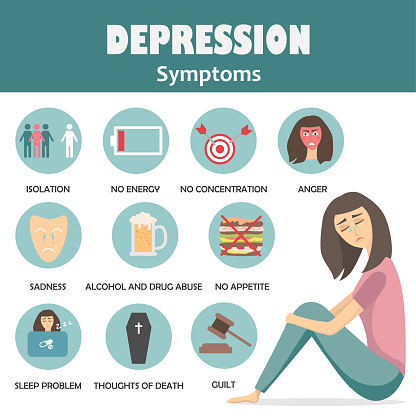Recognizing Depression Symptoms

People with depression experience fatigue, decreased energy, difficulty thinking clearly, and feelings of worthlessness. They may be distracted, sulky, and troubled. In addition to these symptoms, depressed people may also suffer from eating disorders, anxiety, and substance abuse. Depending on the severity of the condition, people may consider suicide. In addition to physical and emotional problems, depression can be life-threatening. There are no known cures for depression.
In order to get a proper diagnosis, you must be aware of depression symptoms. This mental illness affects your mood and behavior, preventing you from experiencing pleasure and enjoyment in everyday activities. Although you may think you are feeling depressed, you might actually be experiencing the symptoms of a common, temporary event. However, it can also be a chronic condition. Fortunately, there are several treatment options available for this disorder. Here are a few tips for recognizing the signs of depression.
Many symptoms are common to depression. Some of them are persistent and recurring. You may also feel tired all the time or have trouble sleeping. You may also experience irritability, anger, or a general lack of interest in pleasure. Sometimes, depression is caused by certain neurological conditions. Regardless of the cause, the best way to get treatment is by visiting a professional who can diagnose and treat the problem. While these symptoms are often common, they are not always a sure sign of a depressive illness.
If you are suffering from depression, it is important to seek help for treatment. Talking to your health care provider is an essential step towards recovery. Be honest and concise with them about what is causing your symptoms. They may ask you when you started experiencing these symptoms and when they started. Describe their frequency and severity. In addition, they may ask you if they are getting worse or better. Moreover, it may be helpful to keep notes during the therapy sessions.
Some other symptoms of depression include feeling tired all the time and sleeping problems. You may also experience irritability, anger, or a lack of interest in pleasure. You may also experience pain in your body that isn’t responsive to medication. You may have an increased risk of suicidal thoughts if you are depressed. If you think you might be depressed, talk to a health care professional. You will be able to avoid severe consequences if you seek help for your depression.
If you notice any of these signs and symptoms, you should see a health care provider for a thorough diagnosis. You should be honest and concise in discussing your symptoms. Your health care provider may ask you questions about the length and frequency of your symptoms. They may also want to know if they are getting worse or better. While you can get help for depression, it is important to remember that these symptoms are not always the same for every person.
Symptoms of depression may vary from person to person. Some of them are normal lows.
Other people have more severe depression. If you have multiple symptoms, your doctor may suspect you have depression. Although you may feel depressed, you do not necessarily have a clinical diagnosis of depression. Various tests can be used to diagnose your condition. You should talk to your doctor and seek medical help at matahidup.com
if you feel you are experiencing any of these symptoms.
A depressive episode is defined as a loss of pleasure from an activity and an episode of depression that lasts at least two weeks. Other symptoms of depression include poor concentration, excessive guilt, and thoughts of death. If you experience any of these symptoms, it is important to see a doctor for a diagnosis. It is best to be honest about your symptoms with your healthcare provider. You must be clear and concise when discussing your feelings. If your symptoms persist, you may be suffering from severe depression.
The symptoms of depression are a combination of different types and degrees of severity. Typically, a depressive episode is a mood disorder and may be a symptom of another psychiatric disorder. Depending on the cause, this can lead to various symptoms. This can range from a temporary reaction to a permanent condition. There are even different signs and symptoms of the disease that are specific to women. It is important to consult your doctor as soon as you suspect that you have depression.